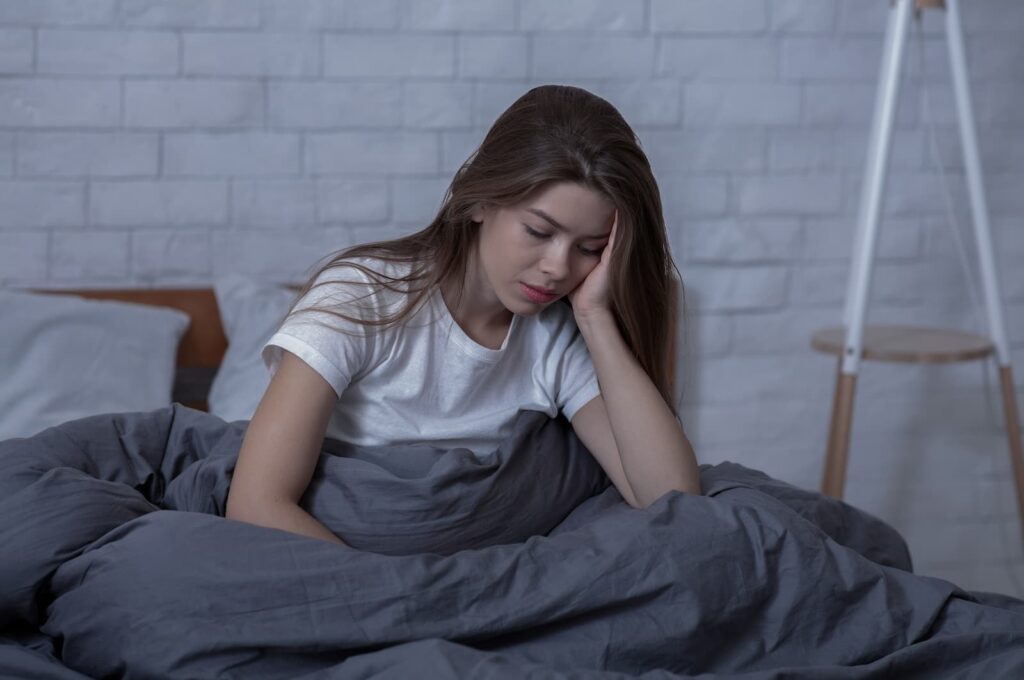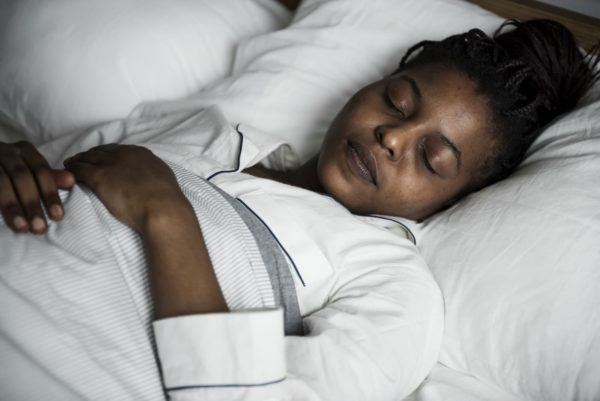Insomnia Definition

Insomnia is a sleep disorder where people don’t manage to sleep or only manage to sleep for under the recommended number of hours, making normal function during the day a challenge. Insomnia is characterised by difficulty getting to sleep as well as difficulty remaining asleep or both. Insomnia can be short term or long term, affecting some in intervals at various stages of their lives.
What Causes Insomnia?
Insomnia is a sleep disorder that can be brought on by a number of factors. There are many common causes of insomnia including internal and external factors. These include:
- Medication
Certain medications include insomnia as a side effect. Medicines which commonly cause insomnia include betablockers and certain antidepressants including fluoxetine and sertraline. Prescription and non-prescription drugs can lead to drug induced insomnia and the severity of the insomnia will vary from person to person.
- Mental health conditions
Many mental health conditions can lead to insomnia including attention deficit hyperactivity disorder (ADHD), schizophrenia and bipolar disorder. For some conditions such as bipolar disorder, insomnia is a core symptom with sleep problems occurring daily. Lack of sleep often leads to mental health conditions worsening and prevents recovery therefore it is essential to seek medical guidance.
- Menopause
Many women going through the menopause experience insomnia as a result of significant hormone changes and the unpleasant side effects that come with it. The menopausal decline of oestrogen brings with it side effects such as hot flushes and sweats as well as mental health conditions including anxiety, all of which can lead to sleep problems.
- Pregnancy
Insomnia in pregnancy is common due to hormone changes, an inability to get comfortable and other common pregnancy side effects such as heartburn and nausea. Insomnia is especially common during the first 12 weeks of pregnancy, with sleep patterns often improving the further into the pregnancy you get. It is important to know that insomnia does not harm the baby although it can make expectant mothers feel low and exhausted.
- Restless leg syndrome
Restless leg syndrome, also known as Willis-Ekbom disease, is a common cause of insomnia with the feeling of restlessness in the legs often worsening in the night. Restless leg syndrome is a condition of the nervous system characterised by the strong urge to move your legs. The jerking and kicking motion of the legs often results in an inability to fall asleep or stay asleep.
- External factors
External factors including noise, an uncomfortable bed and the temperature can lead to insomnia. Changing your surroundings or taking steps to reduce the severity of the problem should improve sleep.
- No cause
Often there is no specific cause for insomnia. This is known as primary insomnia.
Insomnia Symptoms
Common symptoms of insomnia include:
- Inability to fall asleep
- Difficulty remaining asleep
- The feeling of exhaustion during the day from a lack of sleep
- Unhealthy sleeping pattern
- Waking up several times throughout the night
- Lack of energy following a sleep
- Short concentration span due to lack of sleep
Insomnia Conditions
- Sleep-onset insomnia
Most common in younger adults, sleep-onset insomnia is characterised as an inability to fall asleep. Most people suffer with symptoms at night but symptoms can also make daytime naps a challenge. The insomnia results in side effects such as a lack of concentration and exhaustion and can significantly impair cognitive functions.
- Sleep-maintenance insomnia
More common in older adults, sleep-maintenance insomnia is the inability to remain asleep. Sleep maintenance insomnia is characterised as waking up at least once in the night for periods of 20 minutes or more. Sleep-maintenance insomnia can last days, weeks or even years and is commonly improved through a change in sleeping habits.
How is Insomnia Diagnosed?
Whilst there is no specific test to diagnose insomnia, there is a sleep self-assessment form available to take on the NHS website which includes a number of questions to help determine the quality of your sleep. If you score low on the self-assessment, you should consult your GP who will help to make a diagnosis. If the results are inconclusive and sleep continues to impact your daily life, you may benefit from a sleep assessment at a specialist sleep centre.
Insomnia Treatment

The basis of insomnia treatment is developing good sleep hygiene by making people aware of the factors that might be detrimental or beneficial to sleep. Sleeping tablets are not commonly advised but a short course of treatment under the guidance of a medical specialist may help reset a sleeping pattern. Common advice includes establishing fixed times for going to bed and waking, maintaining a comfortable sleeping environment, and avoiding stimulants, heavy exercise or stimulants late at night. The most common methods to treat insomnia include:
- Cognitive behavioural therapy for insomnia (CBT-I)
CBT-I is a cognitive behavioural therapy specifically for insomnia. It is a first-line treatment for adults with chronic insomnia and is proven to be highly effective. The therapy will help identify feelings, thoughts and behaviours that are responsible for the inability to sleep and reframe them in a way which promotes good sleep health. CBT-I strategies can include relaxation techniques such as breathing exercises as well as stimulus control therapy which focus on strengthening the queues for sleep and weakening queues for awakening.
- A change in bedtime routine
For some people, insomnia can be treated by introducing a healthy bedtime routine as this help maintain the timing of the body’s internal clock. Some measure which can be taken to improve one’s bedtime routine include avoiding screen time before bed, avoiding daytime naps, going to bed and waking up at the same time every day and relaxing in bed for an hour before trying to fall to sleep.
- A change in conditions
If insomnia is brought on by external factors such as loud noise and uncomfortable sleeping conditions, poor sleep may be corrected by improving the conditions you sleep in. If you struggle with insomnia as you live near a noisy road, something as simple as wearing ear plugs to block out noise may help improve the quality of your sleep.
Medical Cannabis for Insomnia
Whilst clinical evidence remains limited on the effects of medical cannabis on insomnia, research from the UK Medical Cannabis Registry is promising. Our bodies have a system called the endocannabinoid system that helps control our sleep-wake cycle. The cannabinoids in medical cannabis work with this system, which may lead to changes in sleep quality and anxiety. If you’re interested in learning more about medical cannabis for insomnia, sign up today to see if you qualify for a consultation with one of our specialists. Our team are here to guide you through the process and provide personalised advice.